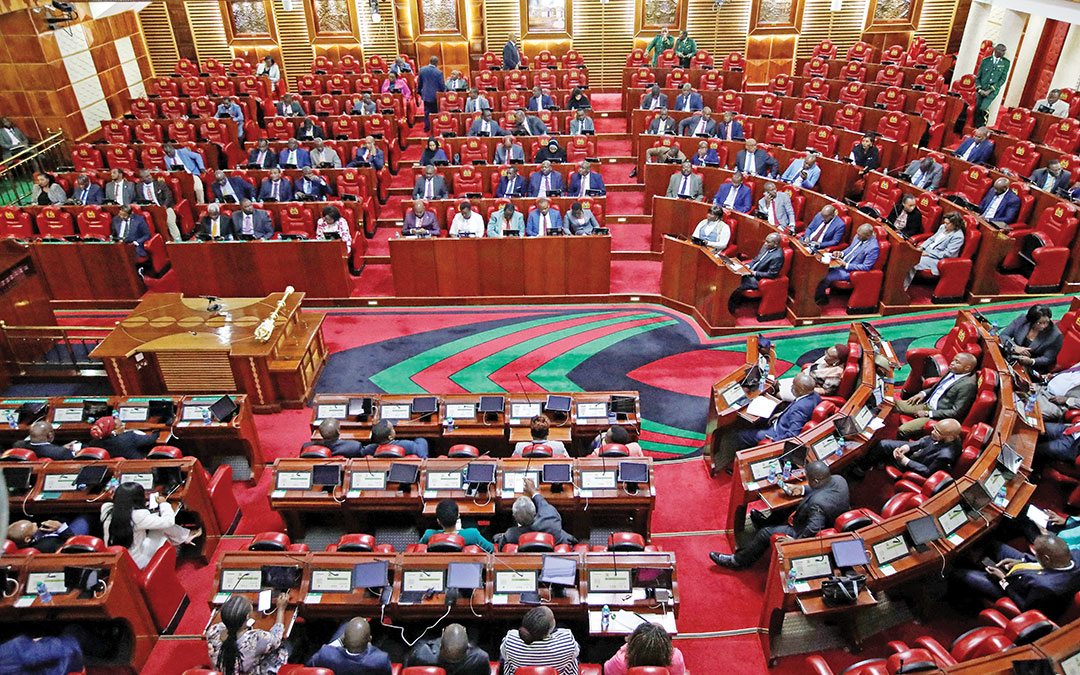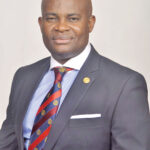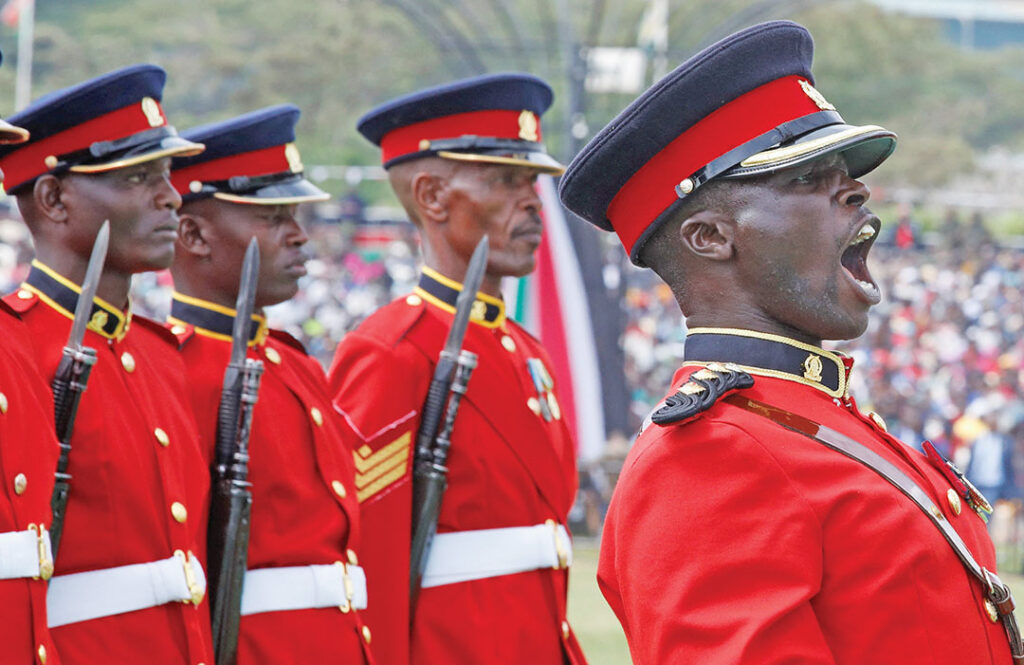ADF STAFF
A military operation in the town of Garu in northern Ghana left one man dead and dozens hospitalized on October 29, 2023.
The raid drew outrage from local residents and resulted in weeks of critical press coverage. The next month, Ghana’s Parliament called the national security minister to appear in the chamber and explain the operation.
In an emotional speech, Albert Alalzuuga, the member of parliament representing Garu, demanded answers. “We are heartbroken, and we call on the minister, we call on parliament to launch a full-scale investigation into this and let the facts be known to Ghanaians,” Alalzuuga said. “This military approach of always beating people mercilessly is one too many in the country. … The military is not trained for internal security and so if you use them to do the wrong exercise, they’ll give the wrong results.”
National Security Minister Albert Kan Dapaah told parliament the raid was to remove weapons from a youth group that had previously attacked national security personnel. He noted reports of excesses by security personnel but said he could not give a full account of the matter because it was before the court system. He reminded parliamentarians of the importance of counterterror efforts in the area, the growing danger of interethnic conflict and the need to keep troop morale high.
“I would like to urge honorable members of the house to please exercise introspection in discussing the matter,” Dapaah said.
The Garu case is just one example of how oversight and accountability can function in a democracy. It is often a tug of war between what the public wants to know and the need for secrecy in matters of national security. Sometimes military professionals are reluctant to answer to civilians. At other times, the quest for information can lead to uncomfortable conversations and stonewalling. But, experts say, when it functions correctly, oversight produces a stronger security sector.
“Security organizations must be answerable to those institutions legally mandated to oversee their activities,” Brig. Gen. Dan Kuwali, commandant of the National Defence College-Malawi, told ADF. “It is in the best interest of the military to be subject to oversight.”
There are several pillars to accountability and oversight that African countries can focus on.

Empower Parliamentary Committees
In many democracies, elected representatives play a key role in overseeing the military. They set budgets, oversee equipment procurement, confirm presidential nominees and hold hearings to scrutinize military activity. However, in some countries, this check on power has become a rubber stamp of approval. Nearly all the power lies with the chief executive, who bypasses parliament on some of the country’s most important decisions.
Some parliamentary leaders are trying to restore teeth to their constitutionally mandated role.
Bertin Mubonzi, a parliamentarian from the Democratic Republic of the Congo, is part of a committee working to “dismantle the criminal networks” that exist within his country’s security sector. His team is investigating allegations of diversion of funds and illegal trafficking of minerals. The work is difficult and, at times, dangerous. “This important work is also very sensitive because some officers have become accustomed, with time, to helping themselves,” he told the Africa Center for Strategic Studies (ACSS). “We must ensure our own safety.”
Mubonzi believes in the value of his role.
“Our role is important because, on the most basic level, not playing the sovereign role that is ours as a committee and as a parliament would amount to giving the government carte blanche,” said Mubonzi, who is president of the Network
of African Parliamentarians for Defence and Security Committees.
One challenge to parliamentary oversight is that many African countries have high turnover in parliament. In each election cycle, 40% to 60% of members leave office, resulting in officials who are inexperienced and lack the institutional knowledge necessary to regulate the armed forces.
Dr. Ken Opalo, who studies the issue and teaches at the Georgetown University School of Foreign Service, said that in some of the best functioning legislatures on the continent, elected officials take the time to build relationships of trust with military commanders.
“Committees that work well are able to establish their own rapport with the generals so that they can understand where they’re coming from,” Opalo said. “That requires trust and constructive dialogue and engagement as opposed to oppositional or confrontational postures that are often common in many legislatures.”
Kuwali similarly believes an effort must be made to help parliamentarians deepen their knowledge of security issues while maintaining their independence. He pointed out that the National Defence College-Malawi has parliamentarians and judges on its faculty to support this information exchange.
“Parliamentary Oversight Committees require staff with technical expertise and experience to help elected officials meaningfully execute their duties,” Kuwali said. “Developing parliamentary expertise in security issues helps to build confidence with their security sector counterparts and plays an important role in the receptivity of their findings.”

Prioritize Transparency
Oversight is only possible when civilians have access to information about the workings of the military. However, defense leaders often demand secrecy about their work and block access to information.
“‘National security’ is often improperly deployed as an all-trumping consideration,” wrote Godfrey Musila, a researcher and former commissioner to the United Nations Commission on Human Rights in South Sudan. “Once invoked, it throws up a veil that forestalls any kind of scrutiny of what government does.”
This secrecy extends beyond operational matters and includes budgets. Kuwali found that of 45 African countries that publish a military budget, 28 did not provide a complete list of expenditures. This makes it nearly impossible for the public to know how money is being spent. It also allows corruption to thrive.
“That is where some militaries get it wrong,” Kuwali said. “The more transparent the armed forces are, the more budgetary support they may get as such actions enhance the confidence of parliamentarians and public officials who allocate funds in the budget. Granted, the military need not disclose the exact details of acquisitions at the expense of compromising national security. However, they need to provide sufficient information about their expenditure.”
There is some cause for optimism. Since 2000, 19 African countries have passed legislation strengthening access to information. In 2012, the African Union Commission on Human Rights and Peoples’ Rights developed a model law outlining how transparency can be codified.
A 2018 report by the Stockholm International Peace Research Institute (SIPRI) evaluated 47 African countries and found that 45 of them had posted at least one official budget document online. This marked an improvement from previous studies.
“Citizens everywhere should know where and how public money is spent. It is encouraging that national reporting in sub-Saharan Africa has improved,” said Dr. Nan Tian, researcher in the SIPRI Arms Transfers and Military Expenditure Programme in a news release accompanying the report.
Bolster Internal Oversight
Many high-performing militaries have established oversight offices to investigate and report on issues relating to the discipline, efficiency, morale, training and readiness of the armed forces. This office, typically called the inspector general, sits within the military chain of command and reports to the service branch chief or the minister of defense.
As an internal oversight mechanism, the inspector general is expected to act as the “eyes, ears, voice and conscience” of the commanders, allowing them to rectify problems before they spread. Ideally, the inspector general supports the work of external bodies like parliament to improve performance.
“Internal and external accountability mechanisms are mutually reinforcing,” Kuwali said. “Such multitiered oversight provides lines of defense to enhance security sector oversight. As a greater number of individuals and institutions provide oversight of security, norms for high standards of professionalism and financial integrity can be reinforced.”
The South African National Defence Force (SANDF) went a step further. In 2012, the country’s parliament created the Military Ombud, which operates independently and outside of the chain of command. This office responds to complaints made by current and past members of the SANDF and investigates complaints or allegations of misbehavior made by the public against the SANDF. In its first eight years the ombud responded to 2,752 complaints, resolving 95% of them.
In a 2019 ceremony marking the end of the tenure of Ombudsman Themba Templeton Matanzima, the retired lieutenant general warned his successor “you will not have many friends now in the military,” but stressed the importance of accountability.
“When there is something wrong, the military must correct that by drilling, by punishing,” Matanzima said. “The office is not about lowering standards of discipline; the office is about human rights.”
Open Up to Civil Society and the Media
Although not part of the formal oversight process, nongovernmental organizations, human rights groups, the media and civil society organizations have an important role. They investigate and amplify stories that require military attention. Many cases of embezzlement or abuse on the continent were uncovered by reporters or human rights advocates.
Other institutions including government-funded human rights commissions and anti-corruption commissions are part of what is called “horizontal accountability.” These groups are mandated to monitor, document and make recommendations regarding abuses.
In a webinar hosted by the ACSS, Abdul Tejan-Cole, former commissioner of the Anti-Corruption Commission of Sierra Leone, stressed the need for independent watchdog organizations.
“Accountability and oversight mechanisms are really the bedrock of democratic societies, and they are crucial for enhancing the rule of law,” Tejan-Cole said. “Nobody is above the law. The police need to be policed, and the army itself needs to be policed. They need to be made accountable to communities and the people they serve.”
A ‘Solemn Responsibility’ Requires Appropriate Oversight
 Brig. Gen. Dan Kuwali of the Malawi Defence Force (MDF) has served in a variety of roles, including legal advisor in the U.N. Mission in the Democratic Republic of the Congo and chief of legal services for the MDF. He is now commandant of the National Defence College-Malawi. He has written and taught about topics relating to security sector governance, human rights, the use of force and humanitarian law. This interview has been edited for space and clarity.
Brig. Gen. Dan Kuwali of the Malawi Defence Force (MDF) has served in a variety of roles, including legal advisor in the U.N. Mission in the Democratic Republic of the Congo and chief of legal services for the MDF. He is now commandant of the National Defence College-Malawi. He has written and taught about topics relating to security sector governance, human rights, the use of force and humanitarian law. This interview has been edited for space and clarity.
ADF: Why do you think the military should embrace accountability instead of resisting it?
Kuwali: The starting point is that no individual or institution is above the law. The principle of democratic control of the armed forces requires that military personnel should be accountable to elected officials who are accountable to citizens. Instances where the military either holds de jure or de facto political power present challenges to democratic governance. Likewise, political interference by defense and security forces effectively renders mechanisms of oversight and accountability toothless. When defense and security officials ignore constitutional dictates and instead protect their own interests, they themselves become a threat to the population they are mandated to defend.
ADF: How can you balance the need for secrecy in military operations with the public’s right to know?
Kuwali: Balancing transparency and confidentiality in the security sector is one of the burning questions in security sector governance. It is imperative for the defense and security sector to have well-trained public information officers and public relations personnel who can help strike that delicate balance. Transparency is a fundamental principle of accountable governance. An opaque security sector creates an environment conducive to abuse and unprofessional conduct. Without information about the formulation and implementation of laws, policies, plans and budgets, it is impossible to hold the military accountable. However, confidentiality is necessary for sensitive matters of state security. Difficulties arise when the need for confidentiality is used to evade scrutiny by appropriate management and oversight bodies or citizens. Experience has shown that by developing trusted relationships with legislative and other oversight bodies, security organizations can retain a high degree of confidentiality in sensitive matters without compromising the principle of public accountability. As a way forward, my suggestion is that the default should be to provide information to the public. Where not possible, reasons for nondisclosure should be given, subject to a review and determination by a competent court or authority.
ADF: What should be done to strengthen the oversight role of parliament?
Kuwali: Effective security sector governance requires a system of checks and balances where vibrant legislatures and independent judiciaries provide the necessary oversight to hold the military accountable to citizens. This helps ensure that the solemn responsibility of security actors to bear arms is used in the interests of society. With mandates that include budget control, approvals of troop deployments, equipment procurement, security policy and personnel issues, parliamentary oversight committees require staff with technical expertise and experience to help elected officials meaningfully execute their duties. Developing parliamentary expertise in security issues helps to build confidence with their security sector counterparts and plays an important role in the receptivity of their findings.
ADF: Do you think there needs to be a cultural change within the armed forces as it pertains to oversight? Can Soldiers change from viewing oversight as a burden to viewing it as a way to improve professionalism and something that leads to better security outcomes?
Kuwali: Although most democratic constitutions provide for the subordination of security organizations to civilian control, both the military and civilian authorities do not always understand the extent and limits of this control. Civilian control of the armed forces is not equal to the direct command and control of the troops. Rather, civilian control refers to the process by which elected civilians set the strategic direction regarding the use of the security sector and these civilian leaders are held accountable by the people. Therefore, we need a cultural change both ways. A quick survey shows that security sector governance is not part of the curriculum of most professional military education. This is why we at the National Defence College-Malawi have deliberately introduced a course on Security Sector Governance and the Rule of Law to ensure that service members understand the raison d’être of and comply with democratic oversight of the military.

